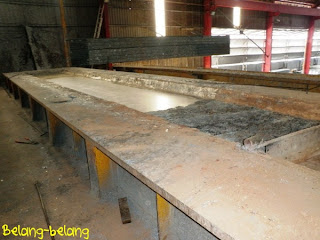Hot-Dip Galvanising Process
Date: 6 December 2010
Location: Malaysian Mega Galvaniser Sdn Bhd, Klang, Selangor
Went for a factory visit with my site supervisors to witness hot-dip galvanising process for our Monsoon Drain Re-Construction Project.
Introduction:
Hot-dip galvanizing is the process of coating iron, steel, or aluminum with a thin layer of zinc. This process results in a metallurgical bond between zinc and steel with a series of distinct iron-zinc alloys.The zinc carbonate formed is fairly strong and protects the steel layer below from further corrosion. Steel will not rust due to the cathodic protection offered by zinc coating, that will be oxidized before steel.
Source: Wikipedia
Process:
Source: MMG SB
1) Degreasing
Surface of material must be properly cleaned before galvanising. The expected lives of hot-dip galvanised products are mainly affected by this process. The material is immersed in a degreaser tank containing detergent additives to remove any substance (oil, greese, soil, soluble paint, etc) and to ensure a perfectly cleaned surface.
2) Rinsing
Water used to remove residues or deposits from the degreasing process.
3) Pickling
Hydrochloric acid solution is used to remove rust or scale from the steel material.
4) Rinsing
One more round! To remove residues or deposits from the pickling process.
5) Fluxing
Zinc ammonium chloride solution used for final cleaning of steel material to prevent it from oxidation. It also conditionds the steel to prepare it for bonding.
6) Drying
Drying process carried out to prevent splashing during the dipping process.
7) Zinc Bath
Steel is immersed into molten zinc at temperature of 450 deg C.
8) Cooling
Steel is immersed in water to cool down.
9) Quenching
Finishing using sodium dichromat wax to allow for longer lasting corrosion-resistance.
10) Inspection
After the process is completed, the newly hot-dip galvanized steel will undergo quality control checks as well as laboratory tests on its coating thickness, adherence or uniformity of the coating and the physical appearance of the end product.
Location: Malaysian Mega Galvaniser Sdn Bhd, Klang, Selangor
Went for a factory visit with my site supervisors to witness hot-dip galvanising process for our Monsoon Drain Re-Construction Project.
Introduction:
Hot-dip galvanizing is the process of coating iron, steel, or aluminum with a thin layer of zinc. This process results in a metallurgical bond between zinc and steel with a series of distinct iron-zinc alloys.The zinc carbonate formed is fairly strong and protects the steel layer below from further corrosion. Steel will not rust due to the cathodic protection offered by zinc coating, that will be oxidized before steel.
Source: Wikipedia
Process:
Source: MMG SB
1) Degreasing
Surface of material must be properly cleaned before galvanising. The expected lives of hot-dip galvanised products are mainly affected by this process. The material is immersed in a degreaser tank containing detergent additives to remove any substance (oil, greese, soil, soluble paint, etc) and to ensure a perfectly cleaned surface.
2) Rinsing
Water used to remove residues or deposits from the degreasing process.
3) Pickling
Hydrochloric acid solution is used to remove rust or scale from the steel material.
4) Rinsing
One more round! To remove residues or deposits from the pickling process.
5) Fluxing
Zinc ammonium chloride solution used for final cleaning of steel material to prevent it from oxidation. It also conditionds the steel to prepare it for bonding.
6) Drying
Drying process carried out to prevent splashing during the dipping process.
7) Zinc Bath
Before dip
After dip
Steel is immersed into molten zinc at temperature of 450 deg C.
8) Cooling
Steel is immersed in water to cool down.
9) Quenching
Finishing using sodium dichromat wax to allow for longer lasting corrosion-resistance.
10) Inspection
After the process is completed, the newly hot-dip galvanized steel will undergo quality control checks as well as laboratory tests on its coating thickness, adherence or uniformity of the coating and the physical appearance of the end product.
Steel before hot-dip galvanising process:
Our trash racks and monkey ladders after the process:















Comments